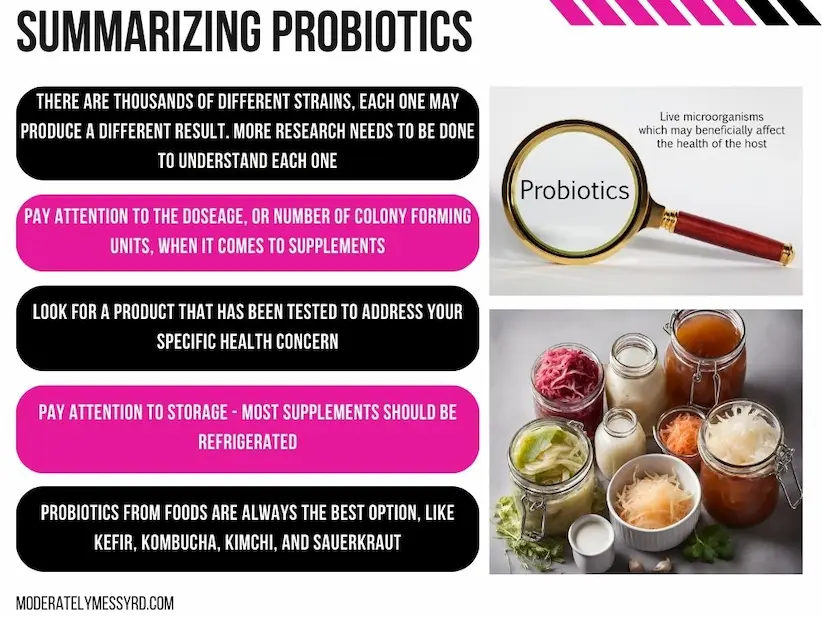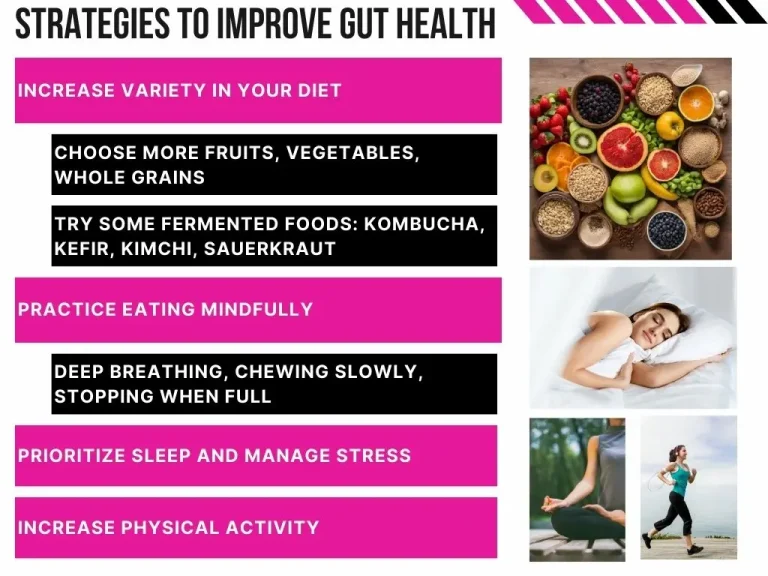Our digestive health can affect our quality of life, both physically and mentally. In the recent years, more and more people have become interested in gut health – as it is estimated that 60-70 million Americans are affected by digestive disease.
However, it seems that everyone has a version of “gut-friendly” – and there’s no specific definition for the term gut health.

Digestive discomfort is a common symptom, and it’s often hard to determine a diagnosis. Working with an RD, as well as a cohesive healthcare team, can help to identify the root causes.
If you’re not quite ready for that step yet, here are some strategies to improve gut health in the meantime.
Get More Variety In Your Diet
What we eat can have a significant impact on the composition of our gut bacteria! Our diet determines which bacteria will thrive in our gut, and that bacteria then aids in digestion.
Adding more variety to your diet ensures that you’re consuming foods rich in both probiotics and prebiotics. Think about foods you’re used to eating but using them in new ways – for example, using yogurt as a marinade for chicken. Or adding different vegetables to your favorite soups. This could also mean giving new foods a try more often.
Look Into Foods or Supplements with Probiotics
Probiotics are live microorganisms that can have a positive effect on your body, including your digestive system, your cardiovascular system, your mood, and even your vaginal health.
Consuming foods and supplements which contain probiotics can be beneficial, however, this topic is very complex! Research on probiotics has exploded over the past decade, but with the thousands of strains discovered – there just isn’t enough research on all of them yet.
What the Research Says So Far About Probiotics
Research is ongoing regarding the different strains and dosages of probiotics. For example, a 2020 systematic review by the American Gastroenterological Association found limited evidence that use of probiotics might reduce disease activity in those with mild-to-moderate ulcerative colitis (1).
Several studies have found modest but positive, beneficial effects of the use of probiotics on IBS symptoms (2, 3) However, which specific strains are the most beneficial remains unclear. For more detailed information on available research for specific strains, read this overview of probiotics from NIH.
Should I Take A Probiotic Supplement?
While taking a probiotic supplement might provide some benefits, the effectiveness isn’t 100% clear – considering there are thousands of different strains and only research on a few of them.
It’s important to understand that the research that has been done is strain and dose specific. So if you’re looking for a probiotic for a specific health condition, you should know what strain AND what dosage has been shown to help with that specific condition.
For example, Activia Yogurt contains the strain B. (animalis) lactis CNCM I-2494, which is recommended for constipation and irritable bowel syndrome.
Quite confusing, right? I recommend checking out this Clinical Guide to Probiotics in the U.S.A. for detailed, strain and dose specific information for various medical conditions.
So as you can see, the answer isn’t quite a yes or no. In most instances we still don’t know which probiotics are helpful.
Foods That Contain Probiotics
Fermented foods typically contain probiotics, and are defined as foods or beverages produced through controlled microbial growth and the conversion of food components through enzymatic action (4). These foods contain lactic acid bacteria, grown during fermentation, which may improve the health of the digestive tract by maintaining the balance of gut microbiota (5).
Yogurt, of course, is the most well-known – many brands of yogurt contain live, active cultures. However, some contain probiotic strains that provide specific health benefits (like the Activia example above).
Other examples include, kimchi, kombucha, miso, natto, sauerkraut, sourdough bread and tempeh.

For a more in-depth breakdown, read The Ultimate Guide on Probiotics and Prebiotics: where I discuss what foods to eat, if you should take supplements, and all the health benefits.
Aim to Eat More Prebiotics
Prebiotics work hand-in-hand with probiotics by acting as the food to help them grow. Like fiber, they aid in digestion, metabolism, hormone production, and blood glucose stabilization.
Examples include:
— Inulin: found in a wide variety of fruits and vegetables.
— Galactooligosaccharides (GOS): found in dairy products, beans, and some root vegetables.
— Fructooligosaccharides (FOS): some food sources include garlic, onion, leeks, asparagus and bananas.

Increase Your Fiber Intake
Many fiber-rich foods contain prebiotics, the food for the good bacteria known as probiotics. Many people don’t get enough fiber even though it has been proven to help soften the stool, improve bowel regularity, and reduce constipation.
When increasing your fiber intake, it is best to start low and go slow. Eating too much fiber when you haven’t been can lead to symptoms like bloating, constipation and abdominal pain.
Figure out what high fiber foods you’re already eating, and lean into that. Increase your fiber intake gradually each day for a couple of weeks with the goal of consuming at least 25 grams per day.

Take a Deep Breath Prior to Eating
You have to rest in order to digest. It’s been shown that our gut and our brain have quite the connection. When stress sneaks into our lives, it can increase gut barrier permeability and lead to inflammation- often leading to digestive symptoms (6).
Therefore, deep breathing techniques prior to eating in an attempt to decrease stress can help to activate the parasympathetic nervous system (which plays a large part in our digestion).
Practice Mindful Eating
HOW you eat can also influence your digestion. This goes along with the strategy above – increased breathing awareness, honoring your hunger cues, chewing slowly, less distractions, eating at a slower pace, and recognizing when you’re full.
Practice eating mindfully using the principles below.

Related Posts:
- High Fiber Foods and All the Benefits
- Food Swaps for Gut Health
- High Fiber Chia Breakfast Bowl Recipe
- Mindful Nutrition and How It Can Change Your Life
Adequate Sleep
When it comes to strategies to help improve our gut health, it’s not just about what we eat. There are studies which show that sleep quality and microbe diversity are linked. Specifically, the composition of our gut bacteria is more diverse when we sleep better.
Therefore, getting adequate sleep can be a strategy to improve your gut health… easier said than done with young kids!
Move Your Body
Recent studies show that exercise can enhance the number of healthy bacteria in our gut, and suggest a consistent fitness routine could be an approach in the treatment of inflammatory diseases (7).
Finding the time to workout as a busy mom can be difficult, but even finding small pockets of time to workout throughout the day can be beneficial.
Wrapping It Up
What we consume in our diet is very important when determining strategies to improve our gut health. However, as you can see from this list, there are definitely many other factors that come into play when aiming to improve gut health!
If only there was a quick and easy solution, right? I sure wish there was one. Our bodies go through so much during pregnancy, and I definitely noticed a difference in my GI health postpartum. Hopefully, with all the hoopla around gut health recently we will only have more defined answers to improving it.
This post was inspired by a webinar I listened to from the National Dairy Council.
